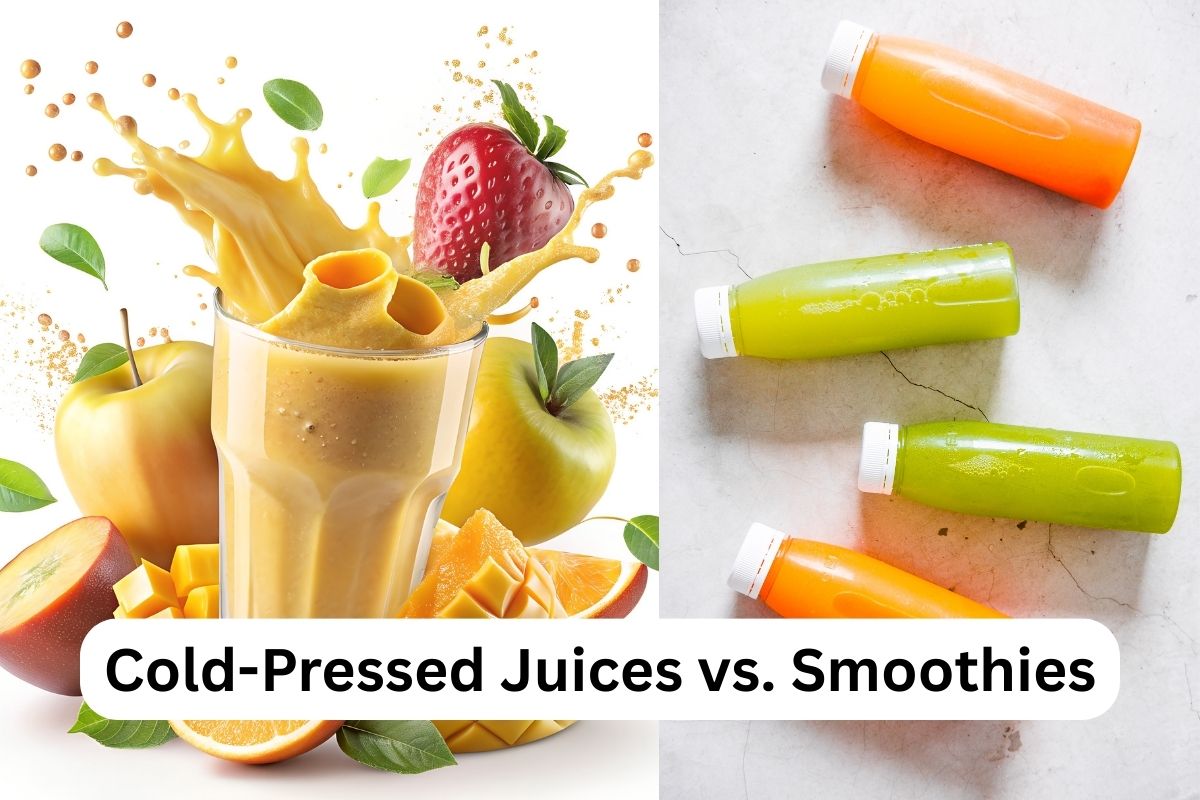In the world of wellness and nutrition, cold-pressed juices and smoothies have become go-to choices for people looking to eat and drink healthier. Both are colorful, refreshing, and often packed with fruits and vegetables. But when it comes to health, many wonder: Which is actually better for your body—juices or smoothies?
The truth is, both drinks have unique advantages and drawbacks. Choosing between them depends on your personal health goals, lifestyle, and taste preferences. Let’s dive deeper into the nutritional science, benefits, and differences of cold-pressed juices versus smoothies.
What is Cold-Pressed Juice?
Cold-pressed juice is made using a hydraulic press that extracts liquid from fruits and vegetables without generating heat. Unlike traditional juicers, this process preserves more nutrients and enzymes.
Benefits of Cold-Pressed Juice:
- Rich in vitamins and minerals.
- Easy to digest since fiber is removed.
- Provides a quick energy boost.
- Ideal for juice cleanses or detox diets.
Drawbacks:
- Lacks fiber, which is essential for digestion.
- Can be high in natural sugars.
- Short shelf life.
- Expensive compared to smoothies.
What is a Smoothie?
A smoothie is made by blending whole fruits, vegetables, and other ingredients like yogurt, protein powders, or nuts. Unlike juice, smoothies retain the fiber and pulp of the ingredients.
Benefits of Smoothies:
- High in dietary fiber, aiding digestion.
- Keeps you fuller for longer.
- Can be customized with superfoods like chia seeds, oats, or protein powder.
- Great for meal replacement.
Drawbacks:
- Can be calorie-dense if loaded with extras (peanut butter, ice cream, sweetened yogurt).
- May spike blood sugar depending on fruit content.
- Heavier and less refreshing than juice.
Cold-Pressed Juices vs. Smoothies: A Nutritional Comparison
| Feature | Cold-Pressed Juice | Smoothie |
|---|---|---|
| Fiber Content | Almost none | High – contains soluble & insoluble fiber |
| Nutrient Density | Concentrated vitamins & minerals | Balanced nutrients with fiber & protein (if added) |
| Digestion | Absorbed quickly, good for a quick boost | Slower digestion, keeps you full longer |
| Calories | Lower in calories (mostly sugars) | Higher calories depending on ingredients |
| Best Use | Detox, hydration, nutrient shot | Meal replacement, weight management, satiety |
| Shelf Life | Short – must be consumed quickly | Longer if refrigerated (12–24 hours) |
| Cost | Expensive due to extraction process | More affordable, especially homemade |
Which is Healthier: Juices or Smoothies?
1. For Weight Loss
- Cold-pressed juice may work if you want a low-calorie, nutrient-packed drink.
- Smoothies are better if you want to stay full and avoid cravings.
2. For Digestion
- Juices are easy on the stomach since fiber is removed.
- Smoothies improve gut health thanks to their fiber content.
3. For Energy
- Juices give a quick burst of energy since nutrients are absorbed fast.
- Smoothies provide long-lasting energy due to fiber and slower digestion.
4. For Blood Sugar Control
- Smoothies are generally better, as fiber slows sugar absorption.
- Juices can cause spikes in blood sugar if consumed in excess.
Deeper Insights: Lifestyle Choices and Situations
- Busy Mornings: Smoothies are great meal replacements because they’re filling and customizable with protein and healthy fats.
- Post-Workout Recovery: Juices help replenish vitamins and hydration quickly. Smoothies with protein powder support muscle repair.
- Cleanses & Detox: Juices are popular for short-term detox diets, though nutritionists warn that fiber loss makes them less sustainable long-term.
- Everyday Nutrition: Smoothies win for balanced nutrition since they combine fiber, protein, and micronutrients.
Common Misconceptions
- Juice Cleanses Are a Magic Detox: While juices can help reset your system, your liver and kidneys are naturally designed to detox your body.
- Smoothies Are Always Healthy: A smoothie can be unhealthy if packed with too much sugar, ice cream, or sweetened syrups. Balance is key.
The debate of cold-pressed juices vs. smoothies isn’t about one being “good” and the other “bad.” Instead, it’s about what suits your lifestyle and goals.
- If you want a quick vitamin boost and hydration, go for cold-pressed juice.
- If you want a filling, nutrient-dense option that supports digestion and satiety, choose a smoothie.
Ultimately, the healthiest choice is to enjoy both in moderation—juices for refreshment and quick recovery, smoothies for complete nourishment.
FAQs About Cold-Pressed Juices vs. Smoothies
1. Which is better for weight loss, smoothies or juices?
Smoothies are better because the fiber keeps you full and helps control appetite.
2. Are cold-pressed juices good for daily consumption?
Yes, but in moderation. They lack fiber and can be high in natural sugars.
3. Can smoothies replace a meal?
Yes, especially if you include protein, healthy fats, and fiber-rich ingredients.
4. Do cold-pressed juices lose nutrients over time?
Yes, they should be consumed within 24–48 hours to retain maximum nutrition.
5. Which is more budget-friendly?
Smoothies are generally cheaper and easier to make at home, while cold-pressed juices are often costly.
